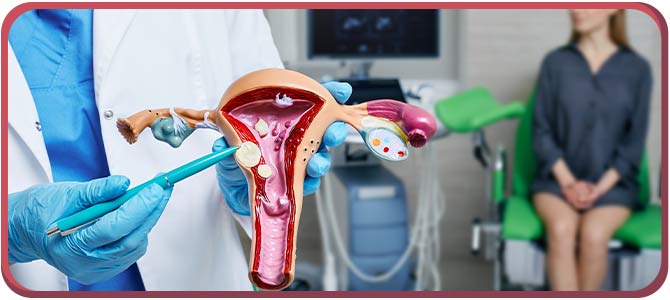The Impact of Fibroids on Fertility and Pregnancy
Fibroids can impact pregnancy in multiple ways, influenced by their size, number, and position within the uterus. When fibroids are believed to affect fertility, several treatment options are available. Meet Dr. Prema Kothandaraman at the OB-GYN & Incontinence Center. For more information, contact us today or book an appointment online. We have convenient locations to serve you in Arcadia, and Glendale, CA.




Table of Contents:
How do fibroids affect pregnancy and fertility?
Is it more difficult to get pregnant with fibroids?
How do fibroids complicate pregnancy?
What size of fibroids can prevent pregnancy?
Fibroids are non-cancerous growths in the uterus that can significantly impact a woman’s fertility and pregnancy. Their location, size, and number can influence reproductive outcomes. Submucosal fibroids, which grow within the uterine cavity, are particularly known to interfere with the implantation of an embryo, potentially leading to infertility. Even fibroids located elsewhere in the uterus, depending on their size, can distort the uterine cavity or block the fallopian tubes, creating barriers to conception.
Additionally, fibroids can alter the blood flow to the uterine lining, further complicating the process of implantation and the maintenance of a pregnancy. During pregnancy, fibroids can pose several challenges. They may grow larger due to increased blood flow and hormone levels, leading to complications such as pain, bleeding, or preterm labor. In some cases, fibroids can cause a miscarriage, particularly in the early stages of pregnancy. As the pregnancy progresses, large fibroids may obstruct the birth canal or necessitate a cesarean section due to positioning issues with the fetus. Managing fibroids before or during pregnancy helps ensure ideal outcomes for both the health of the mother and the baby.
Getting pregnant with fibroids can be more challenging, especially when the fibroids interfere with the reproductive organs’ normal function. The presence of fibroids, particularly those located inside the uterine cavity, can infringe upon the implantation of a fertilized egg, reducing the chances of conception. Fibroids that result in a distortion of the shape of the uterus or block the fallopian tubes can also prevent sperm from reaching the egg or impede the embryo from traveling to the uterus for implantation.
The degree of difficulty in getting pregnant largely depends on the size and quantity of the fibroids as well as their location. However, many women with fibroids can and do become pregnant, though it might require more time or assisted reproductive techniques. Fertility specialists may recommend treatment options such as surgery to remove fibroids or medications to shrink them before attempting to conceive. The impact of fibroids on fertility is assessed on a case-by-case basis by providers at the OB-GYN & Incontinence Center, as some women may experience little to no impact, while others may face significant challenges in becoming pregnant.
Fibroids can complicate pregnancy in various ways, depending on their size, number, and location within the uterus. Fibroids can increase the risk of miscarriage, particularly if fibroids are located within the uterine cavity or near the placenta, where they can disrupt the embryo’s attachment to the uterine lining. Additionally, as the pregnancy progresses, fibroids can cause pain, usually due to their increased size and the pressure they exert on surrounding organs. This pain may lead to hospitalization in severe cases. Fibroids can also contribute to other pregnancy complications, in some cases, large fibroids can obstruct the baby’s descent during labor, necessitating a cesarean section. Fibroids may limit the growth space available to the fetus as well
The size of fibroids that can prevent pregnancy varies depending on their location and number. Submucosal fibroids, even if small, can significantly affect fertility by distorting the uterine cavity and preventing embryo implantation. Generally, larger fibroids can protrude into the uterine cavity or significantly distort the uterine shape and are more likely to impact fertility. Larger fibroids, especially those exceeding 5 to 6 centimeters, are often associated with a higher risk of infertility and complications during pregnancy due to their potential to obstruct the fallopian tubes, distort the uterus, or cause hormonal imbalances. However, not all fibroids, regardless of size, will necessarily prevent pregnancy.
Some women with large fibroids can conceive and carry a pregnancy to term without complications, though this is less common. It’s essential for individuals with fibroids who are trying to conceive to undergo thorough evaluation and treatment by a healthcare provider. In cases where fibroids are suspected to interfere with fertility, surgical removal might be recommended to improve the chances of a successful pregnancy.
Treatment for fibroids is available at the OB-GYN & Incontinence Center. For more information, contact us today or book an appointment online. We have convenient locations to serve you in Arcadia, and Glendale, CA. We serve patients from Arcadia CA, Glendale CA, Monrovia CA, Pasadena CA, Los Angeles CA, Burbank CA, and surrounding areas.


Additional Services You May Need
▸ Urogynecology
▸ Minimally Invasive Gynecology
▸ Monalisa & Medical Aesthetics
▸ Bioidentical Hormone Replacement Therapy
▸ Urinary Incontinence
▸ Pelvic Organ Prolapse
▸ Painful Bladder
▸ Urinary Tract Infection
▸ Genitourinary Syndrome of Menopause
▸ Female Sexual Dysfunction
▸ Urinary Retention
▸ Vaginal Laxity & Prolapse
▸ Postpartum Pelvic Floor Problems
▸ PCOD
▸ Bladder Prolapse Repair
▸ Urgent PC
▸ Fibroids
▸ Excessive Bleeding
▸ Pelvic Pain
▸ Birth Control & IUD
▸ Vaginal & Pelvic Infection
▸ Monalisa Touch
▸ STD
▸ TempsureVitalia
▸ Biote Pellet Therapy
▸ Topical BHRT
▸ Flexsure
▸ Rectal Prolapse Repair
▸ Tempsure ENVI
▸ Minimally Invasive Pelvic Surgery for Incontinence



